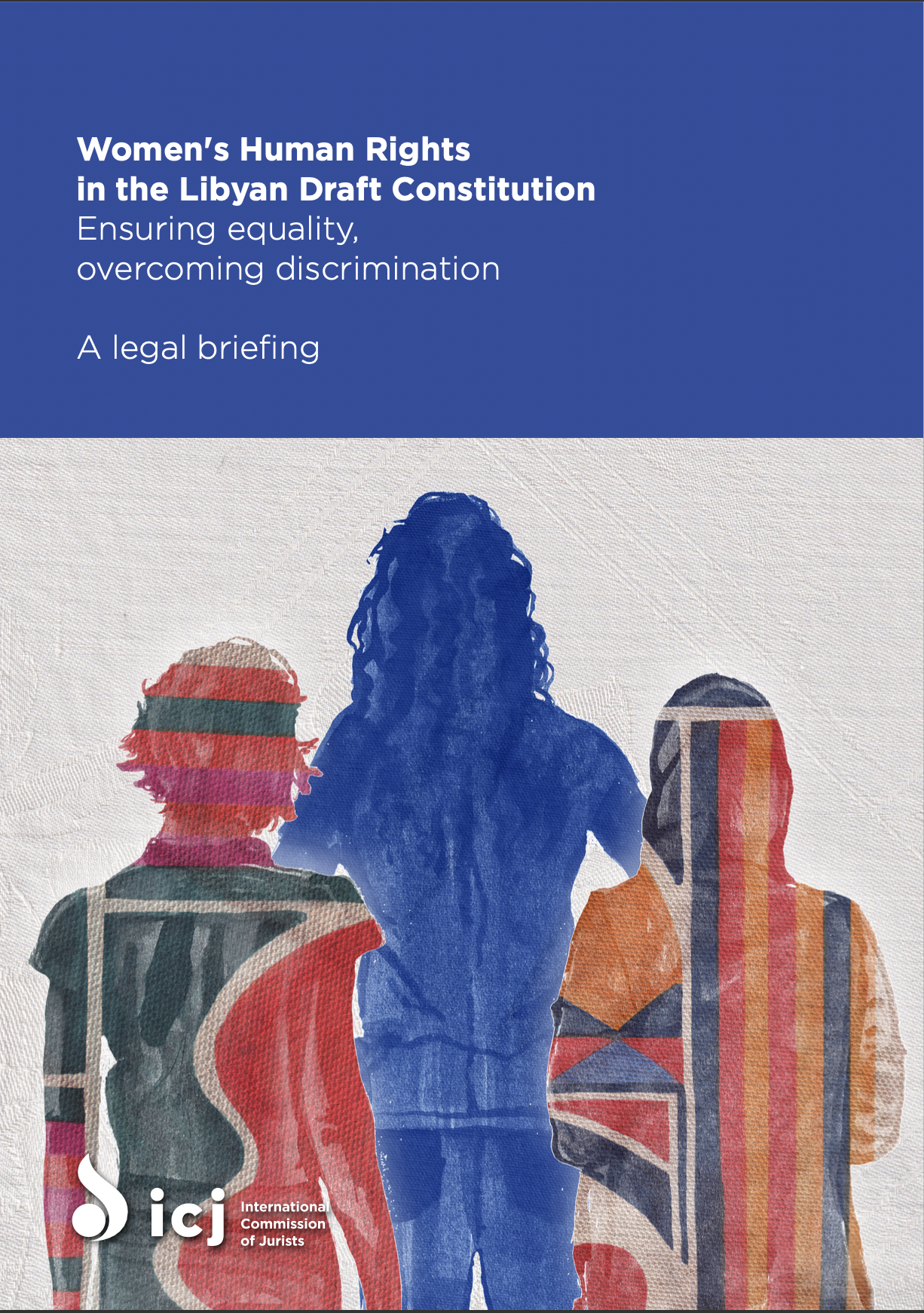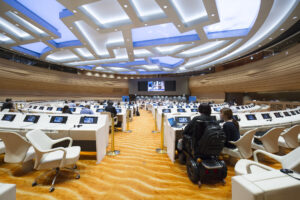The Libyan authorities should improve the protection of women’s and girls’ human rights in the Draft Constitution and ensure their full, unimpeded participation in the constitutional reform process, the International Commission of Jurists (ICJ) said in a briefing paper published today.
.هذا البيان الصحفي متوفر باللغة العربية أيضاً
While parliamentary and presidential elections are due to take place on 24 December 2021, the frameworks for organizing these elections, and for adopting or amending the 2017 Draft Constitution, are yet to be adopted by the Libyan authorities.
The ICJ briefing paper formulates a set of concrete recommendations to improve the 2017 Draft Constitution before it is submitted for approval, in particular by:
- Including a specific clause that ensures equality between men and women in relation to the acquisition, change, retention and transmission of nationality, and prohibits any form of discrimination against women in this respect;
- Including a provision on the protection of women from violence, including sexual and gender-based violence, and requiring State authorities to adopt necessary legislation to prevent, criminalize, investigate, prosecute and punish such acts;
- Clarifying the role of Sharia as a source of legislation, and ensuring that such a role is not impacting on the recognition and protection of universally recognized human rights for women and girls
- Ensuring the subordination of the Constitution to international law, and
- Strengthening the role and mandate of national human rights institution, including with regard to women’s and girls’ human rights.
“Women have historically been excluded from public life in Libya, and the post-Ghadhafi era constitutional drafting process is no exception”, said Said Benarbia, ICJ’s MENA director.
“Any new constitutional settlement in Libya will not deliver justice and enduring peace and stability without women’s effective participation, and the full recognition and protection of their rights.”
The participants in the two Berlin Conferences on Libya, held in January 2020 and June 2021, respectively, highlighted the necessity to “encourage the full, effective and meaningful participation of women … in all activities relating to Libya’s democratic transition, conflict resolution and peacebuilding.”
Thus far, the country’s constitutional reform process has failed to live up to these aspirations and to Libya’s obligations under international law to ensure women’s equality and eradicate discrimination against women and girls.
As women continue to be marginalized, civil society, particularly women’s rights groups, have expressed grave concern about their exclusion by the Constitution Drafting Assembly (CDA) and the lack of inclusive processes.
Within the CDA itself, only six seats out of 60 were reserved to women, despite protests against their inadequate representation. The 2017 Draft Constitution fails to clearly define the status of Sharia as a source of law in the domestic legal order, raising concerns that women’s and girls’ human rights may be violated as a result of enforcing certain interpretations of Sharia, in particular with respect to personal status issues.
Articles 7 and 16 of the 2017 Draft Constitution should also be amended to remove any references to “citizenship” as a basis to benefit from the right to equality, non-discrimination and equal protection of the law without discrimination, and ensure that all the rights and protections under the Constitution are granted to all individuals who may find themselves subject to the jurisdiction of the State, including asylum seekers, refugees, migrants and other persons.
Articles 27 and 51(3) of the 2017 Draft Constitution perpetuates gender stereotypes and the roles that are assigned to women in society. They must be amended to ensure full compliance with international law and standards.
Contact
Said Benarbia, Director, ICJ Middle East and North Africa Programme, t: +41-22-979-3817; e: said.benarbia(a)icj.org
Asser Khattab, Research and Communications’ Officer, ICJ Middle East and North Africa Programme, e: asser.khattab(a)icj.org
Background
In November 2020, under the auspices of the UN Support Mission in Libya (UNSMIL), the Libyan Political Dialogue Forum (LPDF) has elaborated the “Roadmap for the Preparatory Phase of a Comprehensive Solution.” The aim of the Roadmap is to guide Libya through a transitional phase that is supposed to end with the holding of presidential and parliamentary elections on 24 December 2021. As part of this process, a Government of National Unity (GNU) was formed in March 2021 to lead the country towards the elections.
Efforts to establish the legislative and constitutional framework of these elections by the LPDF are still ongoing. At present, the outcome of this process is surrounded by uncertainty given the LPDF members are unable to reach a consensus on a constitutional basis proposal that would function as a legal and institutional framework for holding the 24 December 2021 elections. In parallel, UNSMIL is working with the Libyan House of Representatives and the High National Electoral Commission to develop draft electoral laws.
With regard to the Constitution drafting, the process that led to the 2017 Consolidated Draft Constitution (the latest version of the constitutional text proposed that has arisen from the constitutional reform process ongoing in the country) has failed to ensure the meaningful and effective participation of women, and many of the provisions on women’s human rights included in the 2017 Draft Constitution fail, in numerous ways, to respect, protect and fulfill women’s and girls’ human rights in accordance with international law and standards.
At present, given the lack of clarity on the holding of a referendum on the text of a new Constitution before the national elections scheduled on 24 December 2021, Libya’s constitutional reform process lies in limbo. The legal committee of the Libyan Political Dialogue Forum (LPDF) has proposed to postpone the referendum to decide whether to adopt or reject the new constitutional settlement and, instead, to delegate the constitutional reform to the next elected Parliament.
Download this briefing paper in English.
.لتحميل هذه الإحاطة القانونية باللغة العربية، اضغط/ي هنا




